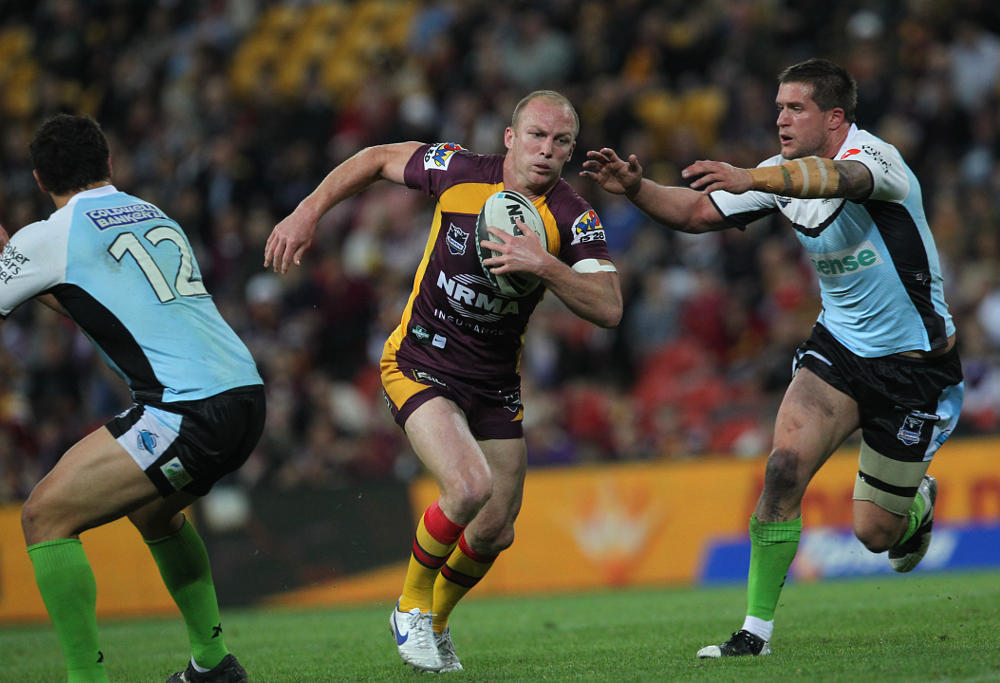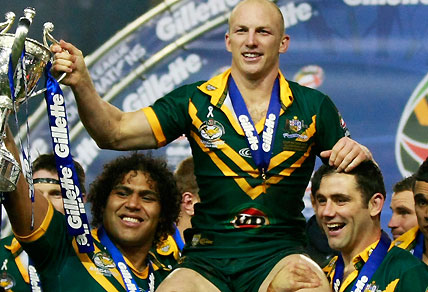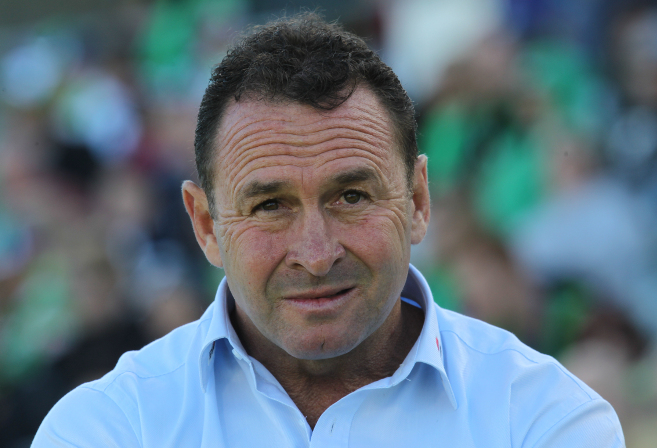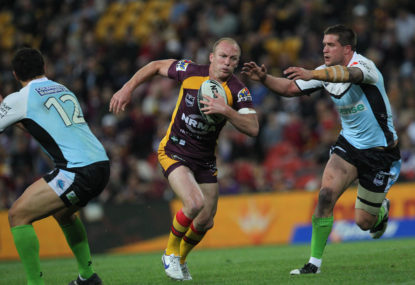Tonight, Darren Lockyer should receive rugby league Immortality. This is because he is the best ‘footballer’ of the modern era.
No other player in my lifetime has the same combination of 1) dominance 2) versatility 3) leadership 4) consistency 5) longevity and 6) ‘big game’ performances. While some might have shaded Lockyer on one specific criterion, none possess a stronger combination of these qualities.
I say again: None. And this is why he is the best footballer I’ve ever seen.
When we talk about greatness we almost exclusively talk about dominance. Andrew Johns, Cameron Smith, Johnathan Thurston. And fair enough.
These guys are all superstars, truly worthy of Immortal status. However these names reveal two interesting things about the Immortality debate.
First, all three guys are traditional first receiver halfbacks / hookers who have lots of touches and spend lots of time on the ball. Second, all three, to varying degrees, spent numerous years refining their craft in one of those specialist high-profile positions.
No drama with this. As primary ball-handlers, they get paid the big bucks to deliver the goods.
However, this does tend to skew the debate towards those types of players. Meaning in turn that players who are dominant – but who are also supremely versatile and outstanding leaders – aren’t afforded the same value.

Darren Lockyer was pretty awesome. I mean, he’s got a highway named after him. Digital image by Colin Whelan © nrlphotos.com
To me this is bizarre. If we were going to come up with criteria for the best footballer in the modern era, these two traits in combination with dominance would be an absolute no-brainer. A truly great footballer can dominate games in totally different positions.
A truly great footballer can also bring out the best in a team filled with other truly great footballers. A truly great footballer has an excellent blend of consistency and longevity. A truly great footballer is almost peerless when it comes to stepping up in big-games.
Immortals possess all these qualities. And no-one possesses them in the same way Darren Lockyer does.
First, there is versatility – which also comes with an important caveat: we’re not just talking about guys who can produce quality outputs across two or more positions over the course of a career, like Greg Inglis, Luke Lewis, Craig Wing or Ruben Wiki.
We’re also talking about guys who absolutely dominated games in one position, then learned a second position, then absolutely dominated games in that position as well.
Greatness comes from doing what very few others have done before. No-one did this before Lockyer. And no-one has done it after, to anywhere near the same extent.
Lockyer entered the NRL as a five-eighth. Then, over the first half of his career, he dominated as an all-round running ball-player at fullback, revolutionising the position and paving the way for fullbacks in the mould of Greg Inglis, Jarryd Hayne and Darius Boyd.
It is true that others had done this to a degree prior to Lockyer’s arrival, but as Tim Sheens once indicated, no-one pioneered the role like Lockyer. This was one of the driving forces behind Lockyer’s 2003 Golden Boot and 2000 Clive Churchill – and there’s probably no better measure of dominance in big games than being best on ground in a grand final.
Then, in 2004, Lockyer completely re-learnt the five-eighth position in response to a request from Wayne Bennett to fill a playmaking hole at the Broncos. He also assumed captaincy of the Broncos, the Queensland Maroons and the Australian Kangaroos around the same time.
In doing this, he won a second Golden Boot, captained a grand final win and was very unlucky not to get the Clive Churchill on a second occasion. Again – all of this happened at five eighth in 2006, three years after being winning the Golden Boot at fullback.
Around that time it was NSW mentor and Roosters’ man Phil Gould who said that “the world’s greatest fullback is now the world’s greatest five eighth”.
And this was while his favourite son, Brad Fittler, was still going around. A few years later, Johnathan Thurston echoed the sentiments: “To make the transition from the best fullback in the world to the best five eighth…well, it isn’t something I could do”.
Lockyer then suffered a dramatic knee injury shortly thereafter. Physically, he was never again the same player.
The injury took away one of his strongest skill-sets: his running game. So, after having adapted to fullback and dominating, then adapting back to five-eighth and dominating, Lockyer fundamentally changed his game to an organising general quarterback role – and again, dominated.
He captained Queensland to the longest winning stretch in State of Origin history, a stretch that he was not only instrumental in at the very beginning, with that famous try to win the series, but one that also continued after well he retired in 2011.
[latest_videos_strip category=”league” name=”League”]
As captain, he was right there in the middle of it when history was made.
Which brings us to the second point: leadership. It takes a truly unique player to captain sides at elite levels and bring out the best, in the best of the best.
Lockyer did this better than anyone, the recent Captain’s Captain award by the Men of League is case in point.
As a traditional second receiver who never had a great number of touches and who liked to watch and wait, Lockyer was content to take responsibility for fifth tackle options and only call the ball when he saw something – which was so very often in critical high-pressure moments.
He paired perfectly with busy half partners and active hookers (like Smith and Thurston) who could play their natural games and not have to worry about organising the team. Look at that final game of the 2011 Origin series.
Queensland’s body language – and Smith and Thurston’s body language – made it clear that NSW was never a chance.
Thurston himself, when asked about how dominant his own performances were during that period, once said something along the lines of: “nah mate, Locky’s the man”.
To be sure, Cameron Smith is a decent comparison when we talk about leadership. However, it’s hard to argue that guys like Andrew Johns (who I rate as the best traditional first-receiver of all time) and Johnathan Thurston were at the same level.
There were very good leaders, to be sure. But neither had Lockyer’s capability and records. Neither possessed quite the same level of ability to steer their teams to victory against the odds in high-pressure games – and both Johns and Thurston were definitely no slouches.
Third, there are the big game performances, which is where you could argue Lockyer is without peer. He demonstrated time and time again at club, state and national levels.
There are just so many examples in utter litany of Immortal-like performances but a few really stand out: there was the 2004 Tri-Nations final against Great Britain, when Lockyer led a depleted Kangaroos team in a completely opposite time and weather zone to a 44-4 victory.
Lockyer had a hand in each of Australia’s six tries in the opening 40 minutes to lead 38-0 at the break, with a final tally of one try, five try assists and five goals.
Interestingly enough, Australian selector at the time Bob Fulton called it “the most dominant display by any player in the history of the game”.
There are several others: Lockyer’s first appearance in an Australian jersey in 1998 was truly one of the worst debuts in rugby league history.
Dropped balls, errors, he had absolutely nothing – two of Lockyer’s fumbles actually lead directly to New Zealand tries and eventual victory. Then, the following week when Brisbane played North Sydney, Lockyer responded in a way that became synonymous with his name: he scored two tries, seven goals and a whole host of try assists for a 60-6 annihilation. It was quite a turnaround.
Then, in the 2001 Origin series, Queensland was coming off the worst defeat in its history with the 3-0 grenade throwing Blue-wash. Game 1, in Queensland’s second possession of the game, Lockyer takes Brett Kimmorley’s fifth tackle kick on the full at the 25 metre line, puts Lote Tuqiri between Jamie Ainscough and Matt Gidley on the left for a run that goes all the way to the NSW 20 metre line, before backing up himself to score Queensland’s first try of the series.

Darren Lockyer had a terrible debut, but responded brilliantly, for Australia. (AP Photo/Tim Hales)
The first points since the Blue-Wash.
Then there was Game 3, with all its focus on Alan Langer’s return and the threat of NSW being the first team in history to win four series in a row. However it was Lockyer who produced the man of the match performance in the victorious Queensland side with two tries and four goals. And this was only his second game as Queensland captain.
The first series win since the Blue-Wash.
Then there was 2006. In this series, Lockyer faced an almost unprecedented level of scrutiny, owing to the fact that, after a Game 1 Queensland loss, NSW were in with a real chance to reach the Origin Holy Grail of four series wins in a row. Even Mal Meninga made no secret that Lockyer’s Origin career was on the line, a threat made even worse given he was also Queensland’s captain. The knives were out, to put it very mildly.
What happened next was something I don’t think I’d seen before: Lockyer winning man of the match in a truly dominant 30-6 Queensland performance, in a side with more than a few no-names. His interview after the match was actually quite amusing – even for the taciturn Lockyer, he looked like he’d just run about a thousand triathlons.
In that same series, there was obviously the Game 3 try, but if you see the very last play of that game with Eric Grothe in the bottom left hand corner of the screen looking to steal back the game, it was Billy Slater who was covering in defence.
Behind him, covering the cover, was…? You guessed it: Darren Lockyer.
And then there was Lockyer’s man of the match performance in Game 2 2010, the game that put Queensland firmly on the front foot to secure its first Maroon-Wash in decades. During that series we also saw something we’d seen so many times: Lockyer throwing the last pass for tries that put daggers in the hearts of NSW fans everywhere.
Game 3: with the Blues leading 18-13, Michael Ennis gives away a penalty; Queensland opts to take the tap with Billy Slater running onto Lockyer’s inside pass to score. Thurston converts and takes Queensland to 19-18, allowing them to eventually win the game and enjoy their first clean sweep in decades. With Lockyer as the captain.
Game 1 2011 was another case in point: Down 10-12 with ten minutes left to play, and on the back of some Corey Parker brilliance, Queensland goes 90 metres in five plays. Smith passes to Thurston, who then passes to Lockyer, who passes inside to Slater for a try. Thurston converts and Queensland win the first game of the series.
As NSW coach at the time Ricky Stuart remarked, “I could go on and on about the little things that Lockyer did to allow Slater to score…but I would just be repeating myself. It is what Darren Lockyer does when big games are in the balance.”

Ricky Stuart was frustrated by Darren Lockyer more than once. (Photo by Colin Whelan copyright © nrlphotos.com)
And not just at Origin level: in the 2006 grand final, it was Lockyer who not only laid on the try that broke Melbourne’s back but then kicked the winning field goal to make sure Brisbane had the critical game winning margin.
Before that, there was that incredible comeback in the 2006 preliminary final where Lockyer secured man of the match honours after steering Brisbane to a 37-20 victory over the Bulldogs – this was after Brisbane had trailed 20-6 at half-time.
Times and time again, it was Darren Lockyer making the big plays in the big games. No-one rose to the occasion quite like him. It was as much what he did, as when he did it.
Surely all of this is Immortal-worthy?
Three side notes before I sign off: Lockyer’s versatility often actually counts against him. When we name the greatest side of the past XYZ years, Lockyer either has to come up against Slater at fullback or Wally Lewis at five eighth. Which often means he then gets put on the bench. Despite being a guy who 1) dominated two completely different positions 2) was probably the best captain of the modern era 3) was consistent over a very long period of time and 4) had a big game record that was basically unparalleled.
Second, in studying Lockyer’s claim to being the best footballer of the modern era, you can make a somewhat similar case for Brad Fittler, and possibly even Laurie Daley. All three are premiership-winning Australian and Origin captains who excelled in a number of different positions.
Interestingly, all three were also traditional second-receivers who didn’t like to stay on the ball the whole time and preferred to only inject themselves at crucial moments. The fact that both Fittler and Daley barely rate a mention is another reason why we need to revise the way we measure ‘greatness’.
Maybe we need to come up with a new category: ‘footballer’, which directly addresses all of what I’ve crapped on about here. It would mean we are not just limiting accolades to halfbacks and hookers.
Immortality should mean much more than that.
Third, a shout out to Renegade I think it was, who in a discussion a few years back probably refined this general opinion I’ve had for quite a while. If you’re reading mate, thanks for the chat. Hope it captures the essence of we talked about. And how about those 2016 Sharks.
Anyway – the key takeaway is this: Lockyer should be an Immortal because he is the best all-round footballer of the modern era. Of all the recent players, no-one possesses the same combination of dominance, versatility, leadership, consistency and big-game performances.
While you can certainly make a strong argument that others slightly shaded on him on one of these criterion, absolutely no-one shades him on these criteria in combination.
He has a body of work that I don’t think anyone matches.
Not Andrew Johns. Not Thurston. Not Smith.
No-one.
If that’s not Immortality than nothing is.
































































































